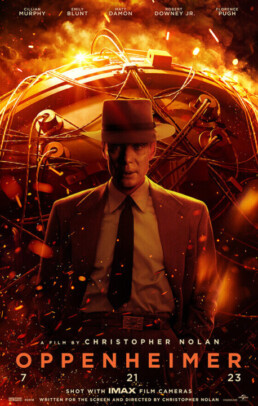Oppenheimer
'Oppenheimer' depicts the nail-biting development of the atomic bomb with grand vision, but fails to convey the impact it had on its creator.
At a time when the future of movie theaters continues to grow more unstable and uncertain, every new film from Christopher Nolan–who intends for his films to be seen on the biggest screens possible–is a moment that cinephiles should celebrate. I saw Oppenheimer in its premiere format: at Hollywood’s TCL Chinese Theater projected on 70mm IMAX film. It is, of course, nothing short of visually spectacular. Oppenheimer is a towering, magnificently made epic that showcases the very best of cinema’s power.
Nolan’s twelfth feature tells a story that’s thematically similar to his other movies, that of one brilliant but haunted man’s crusade to save humanity from world-ending events. At this point in his prolific career, it wouldn’t be a stretch to wonder if Nolan sees himself in each of his protagonists; how he must relate to being on an equally important mission: nothing less than saving cinema.
Nolan’s first biopic tells the story of the father of the atomic bomb, J. Robert Oppenheimer, aka “the most important man in history” as the film quite literally states. In classic Nolan fashion, there are multiple timelines that make up the film. There’s “Fission,” in which we are introduced to the brilliant theoretical physicist (Cillian Murphy) and see how his expertise in atomic energy leads to him being called upon by the U.S. military to lead a secret project to weaponize the explosive power of the atom, as fascism and communism threaten the U.S. amid world war. And then there’s a timeline labeled “Fusion,” which takes place at a later, post-war time, in which Oppenheimer must defend his actions and character from a government that has turned on him and is eager to strip him of his celebrity, credibility, and power.
These timelines interweave quickly, like dueling protons and electrons anxiously stealing each other’s centers. A film of mostly talking heads in various courtrooms and classrooms, the intercutting is similar to The Social Network (that, along with the familiarity of seeing a man and his questionable character being put on trial after changing the world). Jennifer Lame edits the film with a propulsive and suspenseful thrust throughout, an achievement for a film that clocks in at three hours long.
The leaps between timelines also come with visual format changes. Shot by longtime Nolan cinematographer Hoyte van Hoytema, we see Oppenheimer’s rise and the development of the a-bomb at Los Alamos, New Mexico, presented in color, while the courtroom sequences featuring Lewis Strauss (Robert Downery Jr.)–the hopeful Presidential Cabinet Member trying to discredit Oppenheimer–is presented in black and white. The film further cuts between fullscreen and widescreen sizes, depending on IMAX-specific sequences (which may even distract audiences).
Like the mighty atom that lies at the heart of Oppenheimer, there’s a duality to the titular character that makes for a compelling film. Oppenheimer is both a bookish scholar that enjoys academics, as well as a playboy that enjoys lapping up the country’s spotlight. He’s an artist and a politician. Someone brilliant enough to build the deadliest weapon in human history, but shortsighted enough to not understand its eventual consequences for the fate of the world. The tension in Oppenheimer’s dualities–between fission and fusion, stability and explosion, and theory and reality–make for a suspenseful story and examination of humanity’s capabilities and shortcomings.
And yet, the emotional toll that should be the film’s most fascinating element is not something that Nolan dives into fully; that bomb never exploded fully, for me. Nolan’s emotional storytelling has always had trouble meeting the level of his intellect. Oppenheimer is both an incredibly accomplished film but also short-sighted in failing to show the emotional toll that Oppenheimer felt after its use on Japan. While Nolan experiments with surrealistic flourishes that surprised me, the film doesn’t fully wish to penetrate into Oppy’s brilliant, tortured mind that a man who acknowledges himself as “becoming death, destroyer of worlds” would really feel.
That’s not to discredit the absolutely phenomenal job that Cillian Murphy does in bringing the character to life. The thousand-yard stare he gives throughout the film, racked with some consuming sense of existential dread swirling in his gaunt, skeletal face, silently communicates the humanistic horror that lies brimming in his mind. Surrounding Murphy is an enormous ensemble cast. There’s Oppenheimer’s hard-drinking wife, Kitty (Emily Blunt, who’s unfortunately completely one-note); the gruff General Leslie Groves (Matt Damon) that brings Oppy into the fight; and Danish scientist Niels Bohr (longtime Nolan faithful Kenneth Branagh). There are also so many more familiar faces that add to the massive world, such as Josh Hartnett, Florence Pugh, Rami Malek, and Benny Safdie, to name just a few.
I enjoyed Oppenheimer much more than his last film Tenet, as well as Dunkirk before that. Both of those films felt like they were more concerned with showing how Nolan was smart enough to work out a long-form math equation for wide-eyed pupils (although we do still see characters working out long-form math equations here, too). The fact that Oppenheimer has opened with a massive debut is really something to celebrate, both for theaters and cinema on the whole. But although the film depicts the nail-biting development of the atomic bomb with a grand vision–one that I’ll always remember where I was when I saw it–I think that after the dust settles, I’ll still be left wondering what the emotional fallout was for this brilliant, lonely destroyer of worlds.
180 minutes. Rated R for some sexuality, nudity, and language.
Ryan Rojas
Ryan is the editorial manager of Cinemacy, which he co-runs with his older sister, Morgan. Ryan is a member of the Hollywood Critics Association. Ryan's favorite films include 2001: A Space Odyssey, The Social Network, and The Master.



thanks for info